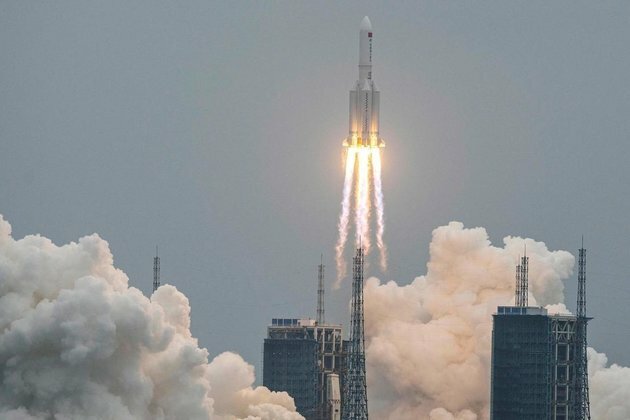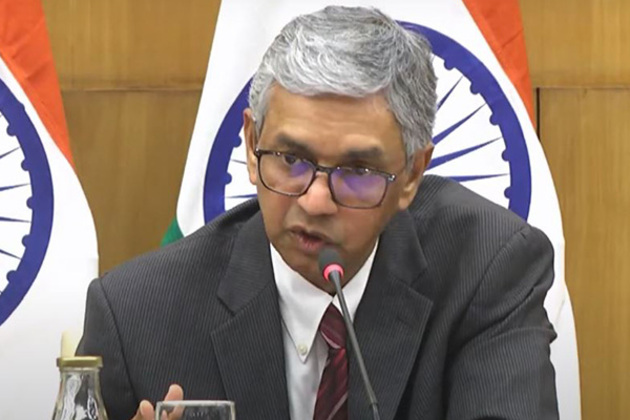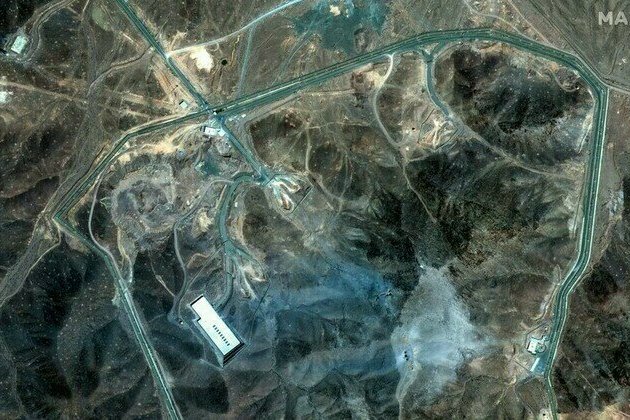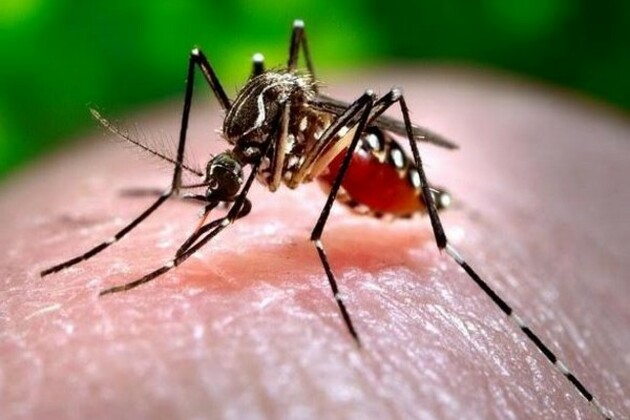Chinese rocket debrisset foruncontrolledplummet back toEarth
France24
08 May 2021, 23:38 GMT+10

Debris from parts of China's Long March 5B rocket is set to crash down to Earth this weekend - but space agencies do not know when or where.
The debris is set to return to the Earth's atmosphere sometime on May 8 or May 9. The Pentagon expects it to land at around 11pm GMT on Saturday but is allowing for a nine-hour margin of error either side.
Space agencies around the world are anxiously following the rocket's uncontrolled descent. The White House said on Wednesday that NASA was doing everything it could to track the remains of the rocket.
The Long March 5B took off last April to install the first part of a Chinese space station that is under construction. The parts of this rocket that are now plummeting to Earth have been orbiting the planet at more than 27,000 kilometres per hour.
It is one of the largest forms of space debris to return to Earth - about 30 metres long and weighing more than 20 tonnes. The debris trail could land as far north as New York, Madrid or Beijing and as far south as the New Zealand capital Wellington, Harvard-based astrophysicist Jonathan McDowell told Reuters this week.
Debris from another Long March rocket landed on some buildings in the Ivory Coast in 2020, causing damage but no injuries or deaths.
US Defence Secretary Lloyd Austin said on Thursday that the US military had no plans to shoot down the oncoming debris. "We have the capability to do a lot of things, but we don't have a plan to shoot it down," he told journalists.
Hopefully, he said, the rocket will land "in a place where it won't harm anyone [... in] the ocean, or someplace like that".
China has said that the risks are minimal because most of the rocket components will probably be destroyed upon re-entry. "The probability of causing harm [...] on the ground is extremely low," Chinese foreign ministry spokesman Wang Wenbin told journalists on Friday.
Many experts agree that most of the debris will probably be destroyed by the friction as it enters the Earth's atmosphere at high speed.
"The most likely event will see any debris surviving the intense heat of re-entry falling into the oceans or uninhabited areas," specialist publication Space News wrote. Nevertheless, "the risk remains of damage to people or property".
'Negligent on China's part'
Given the sheer size of the rocket fragments, some experts say there is a significant risk that a sizeable chunk could fall to Earth instead of burning up in the atmosphere. "A rough rule of thumb" suggests that "between 20% and 40% of the dry mass can survive", Holger Krag, head of the European Space Agency's space debris department, told The Guardian.
This would be enough to cause major damage if it landed on an inhabited area. At present, the most likely place for it to land is in a long band around the equator - encompassing the east coast of Africa to the west coast of South America, the Pacific and Indian oceans as well as a chunk of northern Australia - according to Aerospace Corp, a California-based NGO that advises the US government on space matters.
It is difficult to calculate precisely where it will land because the speed at which it is moving means that the slightest error in calculating its point of entry into the atmosphere could lead to a difference of tens of thousands of kilometres.
>> You can track the debris' trajectory here.
All this could have been avoided by redesigning the rocket. In the 1970s, US and Soviet rockets of a similar size to this first stage of the Long March 5B went crashing down to earth - but now the technology has advanced to such a point that space agencies can design the central part of their rocket in such a way that it doesn't end up orbiting around earth.
Abandoned spacecraft tend to be set adrift far from the Earth's atmosphere or orbiting another mass such as the moon. Remote controls on rocket engines can allow people on Earth to manage their descent so that they land in the ocean, far from inhabited areas. These kinds of operations often ensure that it lands in the vast seas of the South Pacific, between New Zealand and South America.
"What's bad is that it's really negligent on China's part. Things more than ten tonnes we don't let them fall out of the sky uncontrolled deliberately," astrophysicist McDowell told The Guardian.
This problem is likely to get worse as a growing number of non-state actors get involved in space exploration; more and more countries and private companies are sending up satellites and rockets, leaving space debris in their wake. There are currently more than 9,000 tonnes of space debris in orbit - without any accurate maps of where it is headed.
This article was translated from the original in French.
Originally published on France24
 Share
Share
 Tweet
Tweet
 Share
Share
 Flip
Flip
 Email
Email
Watch latest videos
Subscribe and Follow
Get a daily dose of Kenya Star news through our daily email, its complimentary and keeps you fully up to date with world and business news as well.
News RELEASES
Publish news of your business, community or sports group, personnel appointments, major event and more by submitting a news release to Kenya Star.
More InformationAfrica
SectionAva Phillippe makes red carpet debut with boyfriend Dakota Brubaker
Washington DC [US], June 30 (ANI): Actress and film producer Reese Witherspoon's daughter Ava Phillippe stepped out on the red carpet...
"There's more to come": Woakes cautions India of Stokes threat ahead of second Test
Birmingham [UK], June 30 (ANI): England's experienced pacer Chris Woakes has issued a captain Ben Stokes warning and cautioned about...
"India has significant role to play this time": BRICS chairman hails PM Modi's initiatives
New Delhi [India], June 30 (ANI): Harvansh Chawla, Chairman of the BRICS Chamber of Commerce and Industry, highlighted India's importance...
Brazil keen on defence collaboration with India, interested in Akash Air defence system, Garuda artillery guns: MEA
New Delhi [India], June 30 (ANI): The Ministry of External Affairs (MEA) on Monday highlighted that Brazil has expressed significant...
Vocal critic of West seeks reelection as Ugandan leader
Yoweri Museveni has led the African nation for decades after first coming into power in 1986 Ugandan President Yoweri Museveni has...
Apple Music partially restores sanctioned Russian artists
The platform has brought back the profiles of the likes of Shaman and Polina Gagarina Apple Music streaming service has restored...
World
SectionWestern Sydney raid results in seizure of $25 Million in drugs
SYDNEY, NSW, Australia - , Australian Federal Police (AFP) have shut down a secret drug lab in Sydney's west and seized more than 100kg...
Terrorism anywhere is threat to peace everywhere, says EAM at inauguration of 'The Human Cost of Terrorism' exhibition
New York [US], July 1 (ANI): External Affairs Minister S Jaishankar on Monday inaugurated an exhibition at the United Nations on 'The...
Iran warns Ukraine of consequences over recent comments
The Foreign Ministry has delivered a note of protest over Kievs support for US and Israeli military actions Tehran has summoned Ukraine's...
Canada scraps tax on tech giants in bid to revive US trade talks
US President Donald Trump had halted negotiations with Ottawa over what he called an attack on American companies ...
Intel suggests US strikes on Iran caused limited damage WaPo
Intercepted conversations show that Tehran officials expected a worse impact from the attacks on nuclear facilities US strikes on...
Pakistan: Sindh records first dengue death of 2025; most cases in Karachi
Karachi [Pakistan], June 30 (ANI): The Sindh province in Pakistan reported its first dengue-related death of 2025, with a 24-year-old...













